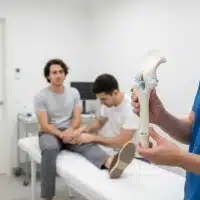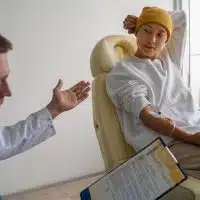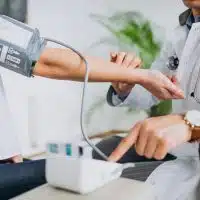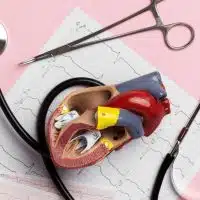Experiencing hand tremors can be unsettling and concerning, leaving many individuals wondering when it’s time to seek professional medical attention. As an experienced human writer, I’m here to guide you through the complexities of hand tremors and provide insights on when a consultation with a neurologist may be necessary.
Understanding Hand Tremors
Hand tremors are a common neurological condition characterized by involuntary, rhythmic shaking of the hands. These tremors can range in severity from mild to debilitating, and can significantly impact an individual’s daily activities and quality of life.
What Causes Hand Tremors?
Hand tremors can have a variety of underlying causes, including:
- Essential tremor: A common neurological disorder that often runs in families
- Parkinson’s disease: A progressive neurological condition that affects movement
- Medication side effects: Certain medications, such as those used to treat psychiatric conditions or thyroid disorders, can cause hand tremors
- Alcohol withdrawal: Sudden cessation of alcohol consumption can trigger hand tremors
- Stress and anxiety: Emotional and psychological factors can contribute to or exacerbate hand tremors
When to Be Concerned About Hand Tremors
While hand tremors are relatively common, there are certain situations when they may warrant medical attention. You should consider seeking a neurologist’s evaluation if:
- The tremors are persistent and interfere with your daily activities
- The tremors are accompanied by other neurological symptoms, such as muscle weakness, changes in speech or balance
- The tremors worsen over time or occur at rest
- The tremors develop suddenly or are accompanied by other concerning symptoms
How Hand Tremors are Diagnosed
To diagnose the underlying cause of hand tremors, a neurologist will typically conduct a comprehensive evaluation, which may include:
- A detailed medical history and physical examination
- Neurological tests, such as reflex and coordination assessments
- Imaging tests, such as MRI or CT scans, to rule out underlying neurological conditions
- Blood tests to check for thyroid or other metabolic disorders
The Role of a Neurologist in Diagnosing Hand Tremors
Neurologists are specialists who are trained to diagnose and treat a wide range of neurological conditions, including hand tremors. They have the expertise to accurately identify the type of tremor and its underlying cause, which is crucial for developing an effective treatment plan.
When to Seek a Neurologist for Hand Tremors
It’s generally recommended to seek a neurologist’s evaluation if:
- The tremors are persistent and interfere with your daily activities
- The tremors are accompanied by other neurological symptoms
- The tremors worsen over time or occur at rest
- The tremors develop suddenly or are accompanied by other concerning symptoms
- You have a family history of neurological conditions that may be contributing to the tremors
What to Expect During a Neurology Consultation for Hand Tremors
During a consultation with a neurologist for hand tremors, you can expect the following:
- A comprehensive medical history: The neurologist will ask about the onset, duration, and characteristics of your tremors, as well as any underlying medical conditions or medications you may be taking.
- Physical and neurological examination: The neurologist will observe your tremors and assess your reflexes, coordination, and other neurological functions.
- Diagnostic tests: Depending on the initial findings, the neurologist may order additional tests, such as imaging or blood work, to help identify the underlying cause of the tremors.
- Diagnosis and treatment plan: Based on the evaluation and test results, the neurologist will provide a diagnosis and recommend an appropriate treatment plan, which may include medication, physical therapy, or other interventions.
Treatment Options for Hand Tremors
The treatment for hand tremors will depend on the underlying cause and the severity of the condition. Some common treatment options include:
- Medications: Certain medications, such as beta-blockers or anti-seizure drugs, can help reduce the severity of tremors.
- Deep brain stimulation: In some cases, a surgical procedure called deep brain stimulation may be recommended to help manage severe, medication-resistant tremors.
- Physical therapy: Specialized exercises and techniques can help improve muscle control and coordination, which can help manage hand tremors.
Lifestyle Changes and Self-Care for Managing Hand Tremors
In addition to medical treatment, there are several lifestyle changes and self-care strategies that can help manage hand tremors, such as:
- Reducing stress and anxiety through relaxation techniques, such as meditation or yoga
- Avoiding known triggers, such as caffeine or certain medications
- Incorporating regular exercise to improve overall physical and neurological function
- Using assistive devices, such as weighted utensils or stabilizing devices, to make daily tasks easier
Conclusion: When Seeking a Neurologist for Hand Tremors is Necessary
If you are experiencing persistent, worsening, or concerning hand tremors, it’s important to seek medical attention from a qualified neurologist. A neurologist can provide a comprehensive evaluation, identify the underlying cause, and develop an appropriate treatment plan to help manage your symptoms and improve your quality of life.
For more information, please call BIMC Nusa Dua at +62 361 3000 911 or +62 811 3896














